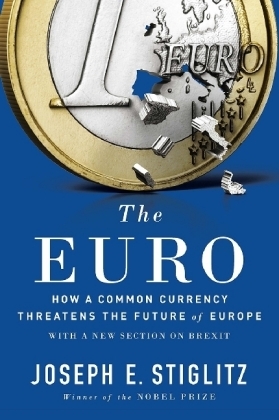
The Euro
How a Common Currency Threatens the Future of Europe
Seiten
2017
WW Norton & Co (Verlag)
978-0-393-35410-2 (ISBN)
WW Norton & Co (Verlag)
978-0-393-35410-2 (ISBN)
The Nobel Prize–winning economist and best-selling author explains why saving Europe may mean abandoning the euro.
When Nobel Prize–winning economist Joseph E. Stiglitz posed this question in the original edition of The Euro, he lent much-needed clarity to a global debate that continues to this day. The euro was supposed to unify Europe and promote prosperity; in fact, it has done just the opposite. To save the European project, the euro may have to be abandoned. Since 2010, many of the 19 countries of Europe that share the euro currency—the eurozone—have been rocked by debt crises and mired in lasting stagnation, and the divergence between stronger and weaker economies has accelerated. In The Euro, Joseph E. Stiglitz explains precisely why the eurozone has performed so poorly, so different from the expectations at its launch: at the core of the failure is the structure of the eurozone itself, the rules by which it is governed. Stiglitz reveals three potential paths forward: drastic structural reforms, not of the individual countries, but of the eurozone; a well-managed dissolution of the euro; or a bold new system dubbed the “flexible euro.” With trenchant analysis—and brand new material on Brexit—The Euro is urgent and timely reading.
When Nobel Prize–winning economist Joseph E. Stiglitz posed this question in the original edition of The Euro, he lent much-needed clarity to a global debate that continues to this day. The euro was supposed to unify Europe and promote prosperity; in fact, it has done just the opposite. To save the European project, the euro may have to be abandoned. Since 2010, many of the 19 countries of Europe that share the euro currency—the eurozone—have been rocked by debt crises and mired in lasting stagnation, and the divergence between stronger and weaker economies has accelerated. In The Euro, Joseph E. Stiglitz explains precisely why the eurozone has performed so poorly, so different from the expectations at its launch: at the core of the failure is the structure of the eurozone itself, the rules by which it is governed. Stiglitz reveals three potential paths forward: drastic structural reforms, not of the individual countries, but of the eurozone; a well-managed dissolution of the euro; or a bold new system dubbed the “flexible euro.” With trenchant analysis—and brand new material on Brexit—The Euro is urgent and timely reading.
Joseph E. Stiglitz is a Nobel Prize–winning economist and the best-selling author of People, Power, and Profits: Progressive Capitalism for an Age of Discontent; Globalization and Its Discontents Revisited: Anti-Globalization in the Age of Trump; The Price of Inequality; and Freefall. He was chairman of the Council of Economic Advisers under President Clinton, chief economist of the World Bank, named by Time as one of the 100 most influential individuals in the world, and now teaches at Columbia University and is chief economist of the Roosevelt Institute.
| Erscheinungsdatum | 07.12.2017 |
|---|---|
| Verlagsort | New York |
| Sprache | englisch |
| Maße | 140 x 211 mm |
| Gewicht | 382 g |
| Themenwelt | Sozialwissenschaften ► Politik / Verwaltung ► Europäische / Internationale Politik |
| Sozialwissenschaften ► Politik / Verwaltung ► Staat / Verwaltung | |
| Wirtschaft ► Volkswirtschaftslehre ► Finanzwissenschaft | |
| Wirtschaft ► Volkswirtschaftslehre ► Makroökonomie | |
| Wirtschaft ► Volkswirtschaftslehre ► Wirtschaftspolitik | |
| ISBN-10 | 0-393-35410-5 / 0393354105 |
| ISBN-13 | 978-0-393-35410-2 / 9780393354102 |
| Zustand | Neuware |
| Haben Sie eine Frage zum Produkt? |
Mehr entdecken
aus dem Bereich
aus dem Bereich
Studienbuch
Buch | Hardcover (2023)
De Gruyter Oldenbourg (Verlag)
CHF 62,90
erfolgreiche Interessenvertretung durch Prozesskompetenz im komplexen …
Buch | Hardcover (2023)
Wiley-VCH (Verlag)
CHF 58,75


